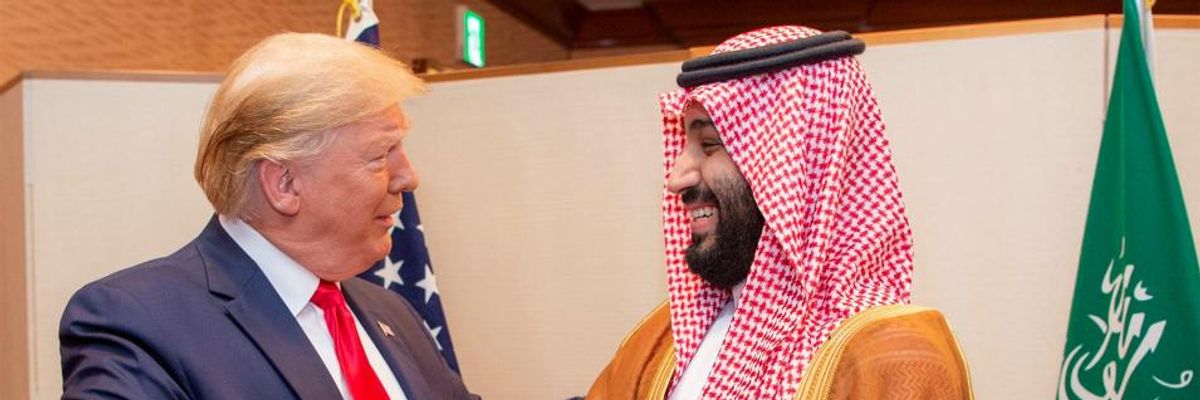Donald Trump is taking marching orders from Saudi Arabia, said progressive members of Congress and foreign policy analysts, after the president tweeted Sunday that the U.S. military is prepared and waiting for the kingdom to assign blame for attacks on its oil facilities over the weekend.
"There is reason to believe that we know the culprit, are locked and loaded depending on verification, but are waiting to hear from the kingdom as to who they believe was the cause of this attack, and under what terms we would proceed," Trump said.
"The U.S. is not obligated to fight Saudi Arabia's wars and we urge Trump to discard his repeated willingness to cede U.S. policy to other nations."
--Jamal Abdi, National Iranian American Council
Karen Attiah, global opinions editor at the Washington Post, called the tweet the "clearest expression of Trump's 'Saudi Arabia First' doctrine yet."
"The Saudi regime has drained its economy of billions to bombard Yemen for years," said Attiah. "All there is to show for it is a humanitarian disaster. This is the regime Trump wants to take targeting orders from."
Saudi and U.S. officials were quick to claim Iran was behind the attack, which paralyzed Saudi oil output and sent crude prices skyrocketing. The two countries based their accusations on flimsy satellite evidence and unspecified intelligence.
Iran denied responsibility for the attacks and accused the Trump administration of spreading "deceit."
Jamal Abdi, president of the National Iranian American Council (NIAC), said in a statement that allowing the Saudis to dictate U.S. foreign policy heightens the risk of "triggering a regional war more catastrophic than the 2003 invasion of Iraq."
"The U.S. is not obligated to fight Saudi Arabia's wars," said Abdi, "and we urge Trump to discard his repeated willingness to cede U.S. policy to other nations."
Lawmakers reminded the president that Congress alone--not the White House nor the Saudi dictatorship--has the constitutional authority to approve U.S. military action.
"Mr. Trump, the Constitution of the United States is perfectly clear," tweeted Sen. Bernie Sanders (I-Vt.), a 2020 Democratic presidential candidate. "Only Congress--not the president--can declare war. And Congress will not give you the authority to start another disastrous war in the Middle East just because the brutal Saudi dictatorship told you to."
Rep. Ilhan Omar (D-Minn.) echoed Sanders in a tweet on Monday.
"Congress has the constitutional power to declare war," said Omar. "Not the president. Not the Secretary of State. And definitely not Saudi Arabia."
The Washington Postreported Sunday that Trump is "contemplating what U.S. officials characterized as a serious military response."
Sunday night, the Trump administration released satellite images purporting to show the oil facility attacks, apparently carried out with drones, originated from Iran or Iraq.
But, the New York Timesreported the photos do "not appear as clear cut as officials suggested, with some appearing to show damage on the western side of the facilities, not from the direction of Iran or Iraq."
NIAC's Abdi slammed Trump for threatening military action on Saudi Arabia's behalf even "before the facts have become clear."
"We do not know definitively who was behind the attacks, though Houthi forces in Yemen have been at war with the Saudi coalition since 2015 and have claimed responsibility for them," said Abdi. "Iran has a motive, given the economic warfare being waged against it, but there is no smoking gun to implicate them."
"Those jumping to conclusions without sufficient evidence," Abdi said, "seem eager to embroil the U.S. in another war that does not serve our interests."

